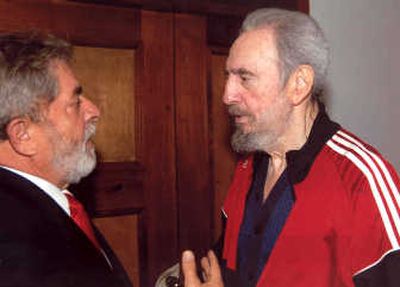Castro may relinquish top role

Cuba’s election Sunday for the national legislature includes the ailing Fidel Castro as a candidate, but experts say the vote may well be the first step toward his retirement.
Castro has recently hinted he’s willing to give up his role of president – opening the door for the first time for the rubber-stamp National Assembly to become a critical force in choosing who runs the island, experts say.
“Is the Council of State going to elect a chief of state for the next five years a person who has not been seen in public for a year and a half?” said Cuba expert Paolo Spadoni, a visiting assistant professor at Rollins College in Winter Park, Fla.
“To me, it’s more probable that he will relinquish that role,” he said. “There’s a good chance Fidel Castro will not be the next president.”
Cubans head to the polls Sunday to choose 614 members of the National Assembly. All the candidates are running uncontested and have virtually no chance of losing. Among them: Fidel Castro, 81, whose name will appear on the ballot representing Santiago de Cuba.
Castro was nominated even though he turned over power to his brother Raul “temporarily” in July 2006 after suffering from intestinal bleeding. Three surgeries later, he has not returned to office, and 75-year-old Raul continues to run the nation.
Castro has only been seen in sporadic videos and photographs, the latest this week when he appeared in a video with Brazilian President Luiz Inacio Lula da Silva.
“I think Fidel is ready to take on his political role in Cuba and his historical role before the world,” Lula da Silva said after his meeting. He added that Castro was “incredibly lucid” and has “impeccable health.”
But despite Lula da Silva’s and others’ assurances that Fidel’s health is on the upswing, experts say the next part of the Cuban elections process could show otherwise.
The winners of Sunday’s National Assembly election will choose which members will serve on the legislature’s ruling Council of State, which in turn selects the president every five years. That decision is expected in early March. Castro’s title of president refers to the presidency of the Council of State.
There is a good chance Castro could either withdraw his name from consideration, or be named to an honorary post where he can continue writing essays on world issues and offer guidance, Cuba watchers say. The decision would pave the way for a permanent title for Raul or perhaps open the way for someone younger.
“My basic duty is not to cling to office, and even less to obstruct the path of younger people, but to pass on the experiences and ideas whose modest worth stems from the exceptional era in which I have lived,” Castro said in a letter to the Cuban people in December.
This week, Castro wrote that he’s too sick to speak directly to his constituents, which further fueled speculation that one of the world’s longest-serving rulers was ready to pass the torch.
“It’s really unheard of in the annals of history to have a temporary head of state for that long,” said Mauricio Font, who heads the Bildner Center for Western Hemisphere Studies in New York. “It’s getting to be a bit bizarre. Cuba must be a really weird place right now because nobody really knows what’s going on.”
The Cuban press has hailed Sunday’s election as a true democratic process – one that will change the face of the National Assembly.
More than 60 percent of the candidates are younger than 50, Cuba’s daily newspaper Granma reported, and only one-third are incumbents. Women make up 42 percent of the candidates, and blacks 20 percent. Only 17 percent of the candidates are old enough to have experienced capitalism in pre-Castro Cuba.
At least one Santeria high priest and three evangelical ministers are also on the slate of candidates.